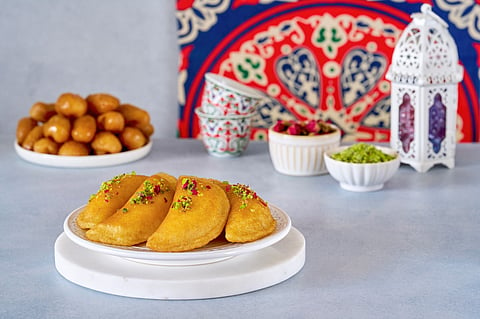
- Destinations
- Experiences
- Stay
- What's new
- Celebrating People
- Responsible Tourism
- CampaignsCampaigns
- SubscribeSubscribe
- Buy Now

Saudi Arabia boasts a rich array of delectable desserts that significantly influence its culinary heritage. These sweets are particularly cherished during festive seasons and special occasions like Ramadan, when families and friends gather to break their fast. From the beloved maamoul, a traditional shortbread cookie often filled with a variety of ingredients to the ever popular kunafa, a sumptuous layered pastry that typically features a filling of soft cheese or sweet cream, encased in thin, crispy strands of pastry known as kataifi - the treats reflect the rich cultural tapestry of Saudi Arabia, showcasing the country’s culinary creativity.
Basbousa is a special dessert known for its unique combination of flavours and textures. It is a semolina cake soaked in a sweet syrup, often flavoured with rosewater or orange blossom water. This creates a delightful contrast between the crispy, semolina-based exterior and the soft, syrup-soaked interior. Additionally, incorporating ingredients like coconut and nuts enhances its distinct flavour profile.
Maamoul is cherished for its unique combination of textures and flavours, historical significance, and traditional preparation methods. These cookies, resembling shortbread, are typically filled with sweet ingredients such as dates, pistachios, or walnuts and often infused with rosewater or orange blossom. Maamoul is found in souks and markets in Saudi Arabia, especially popular during holidays like Eid, and making it is often a beloved family tradition.
Luqaimat is a sweet, fried dumpling typically coated in date syrup or honey. It features a crispy exterior and a soft, airy interior. The combination of textures and rich, sweet flavours makes it a beloved treat, especially during Ramadan and other festive occasions. Moreover, luqaimat reflects the region's culinary traditions and offers a glimpse into the warmth and generosity of its people.
Qatayef is special because of its unique texture and versatility. These yeasted pancakes are cooked on one side, creating a crispy exterior and fluffy interior. They are typically stuffed with fillings like nuts, sweet cheese, or cream and then fried or baked, often served with a sweet syrup. Qatayef is a cherished dessert, especially during Ramadan, and can be made with or without frying, offering a range of flavours and textures.
Kunafa is one of the most popular and well-known desserts from the Middle East. It features a crispy, golden, shredded pastry, often soaked in sweet syrup, and layered with a rich, creamy cheese filling. The result is a dessert with a satisfying balance of crispy, creamy, and sweet elements, making it a popular treat, especially during festive occasions. The thin, noodle-like pastry (kataifi) is the foundation of Kunafa, offering a delightful crunch. The pastry is generously soaked in a sugar-based syrup, adding sweetness and moisture. Kunafa can be customised with various fillings, like cream, nuts, or coffee, allowing for different flavour profiles.
Another famous dessert from the Middle East, Baklava's special qualities lie in its unique layering of phyllo dough, combined with a rich filling of nuts and a sweet, honey-based syrup. Baklava's distinctive texture comes from the thin, paper-like layers of phyllo dough, which are brushed with butter and layered with nuts such as walnuts or pistachios. Baklava is more than just a dessert; it symbolises hospitality and tradition, often served during celebrations and special occasions. While the core ingredients remain the same, baklava recipes vary across different regions and cultures, with some versions using different nuts, spices, or syrups.
Kleicha is a traditional Saudi Arabian pastry from the Al-Qassim region. It is a sweet, round or oval cookie often filled with dates, nuts, or other ingredients such as coconut. This delicious treat is especially popular during Eid, as well as other celebrations and ceremonies. While dates are the most common filling, Kleicha can also be made with nuts, coconut, or Turkish delight. Cardamom, a key ingredient in its preparation, adds a warm and aromatic flavour. Rose water is sometimes included as well. Before baking, the dough is often decorated with intricate patterns pressed into its surface. Additionally, a glaze made of egg wash, which can be scented and coloured with saffron, is commonly applied.
